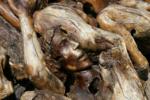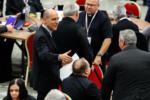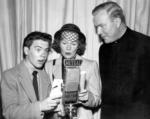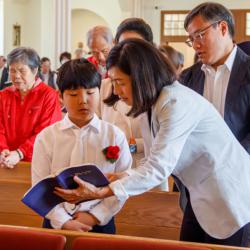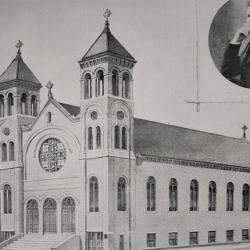Olivewood carvings help support Christians in the Holy Land
CHELSEA -- On Feb. 3 and 4, hundreds of wooden Christs, Madonnas, hands clasped in prayer, crosses, crucifixes, rosaries, blessings, Pietas, Last Suppers, and 10 Commandments were meticulously arranged on tables in the sanctuary and basement of St. Rose of Lima Parish in Chelsea.
The distinct grain of the olive wood, hand-carved in a traditional style passed down by generations of Christian families in the Holy Land, resembled tears coming down the faces of the carved Christs and Marys. The wood comes from the dried trimmings of olive trees that have grown in the Holy Land for thousands of years, some dating back to the life of Christ.
"We grew up with the olive wood carvings," Fuad Nicola Mukarker, a Palestinian-American Catholic from a family of carvers, told The Pilot on Feb. 4. "We've been doing it for hundreds of years."
Since the latest war between Israel and Hamas began in October 2023, Mukarker has traveled to parishes throughout the Archdiocese of Boston to sell the carvings and raise money for 50 Catholic families in the Holy Land, where Christians make up less than one percent of the population. The money will go toward food, schooling, medical care, fuel, and other necessities.
"We just suffer through different wars," he said. "We'd like to see peace happen, and that's why we're promoting this here, to help Christians stay in the Holy Land. Nothing against other religions, but our mission is to keep Christianity alive where it started."
Wood carvings, sold to pilgrims and tourists, are the livelihood for many Christians in the Holy Land. When war breaks out and pilgrims stop coming, their only hope is to export the carvings for sale overseas. Even as war rages, Christians in the Holy Land are still making carvings for export.
"We're kind of living between both sides fighting," Mukarker said. "We're the bridge of peace, and hopefully, they'll come to realize that we're all human beings and should live together in peace."
Mukarker's parents, siblings, and their children still reside in the Holy Land.
"They've been struggling with basic stuff," he said, "like going to work or going to school. Other people in other parts of the Holy Land are struggling to find food and shelter. Now winter's coming, and many people have no place to stay. No one is safe."
He knows many people who live in Gaza, several of whom have been killed since the war began.
"Seeing the miseries of how other people go through life, you feel blessed just to be alive," he said. "My faith has played a big role in me gathering the strength to continue doing this and supporting the Christian family."
Mukaker, 47, was born in Jerusalem and spent the first 22 years of his life in Bethlehem. The Israel-Palestine conflict surrounded him throughout his childhood, but he said that the current war is worse than any that have come before it.
"This is the worst," he said. "We've never had anything like that happen. And this is why I felt there is a need for me to do something to help the community over there."
Violence was a regular occurrence for him and his family. He has had to remove bullets from the side of his car and the side of his house.
"The violence is affecting everybody that lives there, whether you're part of it or not part of it," he said.
Around the year 2000, when he was driving to work from Bethlehem to Ramallah, his car was caught in the crossfire as Israeli soldiers fired on Palestinian children throwing stones. That was the final straw for him.
"I don't want to get killed just for being there," he said.
He moved to the U.S., got a master's degree in business from a Catholic university, and settled in Belmont, where he owns a Mediterranean restaurant. On the weekends, he goes to parishes to sell carvings.
"We got a lot of support from the priests and fathers, inviting us over, wanting to help," he said. "And the parishes have been very receptive to it."
Many of the priests who have invited him to sell carvings have been on pilgrimages to the Holy Land and have met the Christian community there.
"They know how much we're struggling," he said. "That's why they allow us to come to church."
Mukarker spoke to parishioners during Mass at St. Rose's on Feb. 3 and 4.
He greeted them by saying: "Salaam, peace, shalom. This is what we don't have right now in the Holy Land."
He encouraged them to purchase carvings to support their "brothers" in the Holy Land.
"We live under a lot of pressure from the fighting that is happening right now," he said. "A lot of kids are being killed and a lot of people go to bed hungry and thirsty."
His message resonated with the faithful in Chelsea. Feb. 4 turned out to be one of Mukarker's most profitable days since he started selling carvings.
"Thank God," he said.

